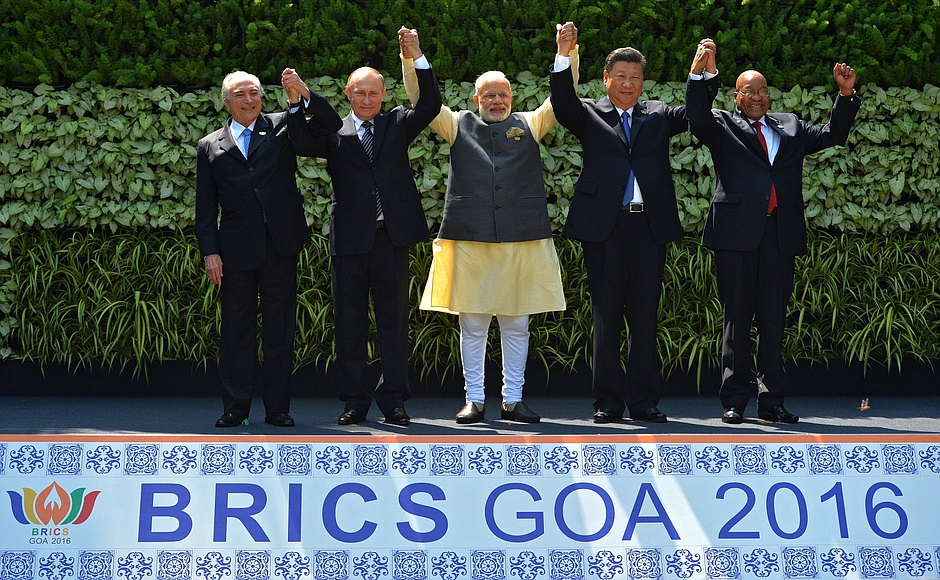
BRICS gives Russia a firm presence in the continent.
Kremlin.ruA few days after tensions over Syria forced Vladimir Putin to cancel a planned trip to Paris for the inauguration of a Russian cultural and religious center, a red carpet was extended to the Russian President in the Indian state of Goa. Putin’s visit to India for the 17th annual Russia-India Summit and the 8th annual BRICS Summit could not have come at a better time, but analysts are divided over the extent of gains for the Kremlin.
“Nobody in BRICS takes the idea of isolating Russia seriously,” says Georgy Toloraya, Executive Director, Russian National Committee on BRICS research. “Putin gets support from BRICS and other partner countries on key issues like Syria. In this sense, the summit in Goa is a success for Russia.”
Anton Tsvetov, Expert at the Center for Strategic Research, Moscow, says the BRICS Summit is an important vehicle to demonstrate Russia’s international standing at a time when its relations with the West are deteriorating.
“Russia has been very industrious in demonstrating that the world is not comprised only of the West and its global allies, but that there are other games in town,” Tsvetov says. “BRICS is one of the most obvious choices as it does not require a lot of actual commitment while being impressive in terms of combined GDP, population and growth.”
Alexander Gabuev, Director of the Moscow Carnegie Center's Asian Program, agrees that the BRICS summit will be used by the Kremlin to show the West that Vladimir Putin cannot be isolated globally. He, however, adds that the BRICS members cannot provide any “tangible” support to Russia.
“Despite these countries not supporting the sanctions against Russia, their companies and banks remain very risk aware and are not trying to ‘help’ Russia - only the Chinese perform some small symbolic transactions to cement Putin's relationship with Xi Jinping. So the West is unlikely to be impressed by the Russian PR effort,” Gabuev says.
In addition to his summit with Indian Prime Minister Narendra Modi on Oct. 15, which was hailed as a huge success by the Indian media, Putin is also holding bilateral meetings with other BRICS leaders, as well as some heads of government of the Bay of Bengal Initiative for Multi-Sectoral Technical and Economic Cooperation (BIMSTEC), an informal grouping that was invited for the BRICS outreach summit. BIMSTEC comprises of Bangladesh, Bhutan, India, Nepal, Sri Lanka, Myanmar and Thailand.
The bilateral meetings held by Vladimir Putin on Goa are also key to the Russian official narrative that the country is in fact not isolated,” Tsvetov says. “We have seen similar moves earlier this year: from the ASEAN-Russia Summit in Sochi in spring to the Eastern Economic Forum on Vladivostok with Shinzo Abe and Park Geun-Hye. The sheer number of meetings and talks is to show that Russia has other partners beyond the West, even if the summitry itself is more significant than the following deals and cooperation projects.”
Besides, Thailand, which is being represented by a vice foreign minister as Prime Minister Prayuth Chan-Ocha cancelled his trip on account of the death of King Bhumibol Adulyadej, and Myanmar, represented by Aung San Suu Kyi all other BIMSTEC countries have sent their heads of government for the summit.
“BIMSTEC countries have so far not been a Russian foreign policy priority, so this summit is a good chance for Russia to reactivate ties with them,” Toloraya says.
Gabuev, however, believes that Moscow is unlikely to use the outreach summit or bilateral meetings to correct its negligible ties with BIMSTEC members.
The Syrian crisis dominated the agenda in Putin’s talks with his Chinese counterpart Xi Jinping on Oct. 15. Beijing has not blamed Moscow for the escalating violence in the civil war-ridden West Asian country.
“The Russian president and the Chinese president exchanged views on the Syrian issue. Putin informed his Chinese counterpart on local developments," Russian Presidential spokesman Dmitry Peskov told reporters. “[During the meeting] the need for further cooperation to prevent the infiltration of the international terrorism into the territory of Central Asia and through it, was stressed.”
Gabuev says Russia’s relationship with China has gotten stronger over the last few years but cautions that the ties are increasingly asymmetric. “Moscow needs Beijing more than Beijing needs Moscow,” he says.
In his meeting with South African President Jacob Zuma, Putin discussed cooperation in the peaceful use of nuclear energy, as well as mutual protection of investments.
South Africa is looking to develop 9,600 megawatts of nuclear capacity by 2030, and Russian state nuclear corporation Rosatom has expressed interest in developing the country’s nuclear sector.
Putin and Zuma also spoke about the small drop in trade turnover between the countries in 2016. “Both parties know what needs to be done to compensate for this slight fall,” Kremlin spokesman Peskov told reporters.
Analysts widely agree that Russia needs to do a lot more to build its ties with traditional allies in Africa. BRICS gives Russia a firm presence in the continent.
All rights reserved by Rossiyskaya Gazeta.
Subscribe
to our newsletter!
Get the week's best stories straight to your inbox